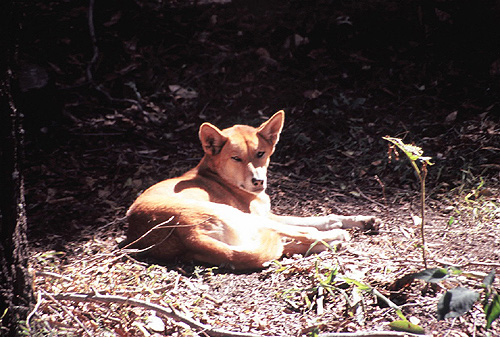Australia is rich in animal species. There is around 240 species of mammals, 800 species of birds, 380 species of reptiles, 122 species of frogs, and 180 species of freshwater fish. Some 83% of mammals, 89% of reptiles, 90% of fish and insects and 93% of amphibians that inhabit the continent are endemic to Australia.
 The most famous group of animals are marsupials which are a class of mammal. Notable marsupials include Kangaroos, Wallabies, Koalas, Wombats, Tasmanian Devils, and Possums. A more unusual class of mammals are Monotremes which include the Echidna and Platypus. The latter is an egg-laying, venomous, duck-billed, beaver-tailed, otter-footed mammal which baffled European naturalists when they first encountered it, with some considering it an elaborate hoax.
The most famous group of animals are marsupials which are a class of mammal. Notable marsupials include Kangaroos, Wallabies, Koalas, Wombats, Tasmanian Devils, and Possums. A more unusual class of mammals are Monotremes which include the Echidna and Platypus. The latter is an egg-laying, venomous, duck-billed, beaver-tailed, otter-footed mammal which baffled European naturalists when they first encountered it, with some considering it an elaborate hoax. The Australian Dingo is an ancient, wild, primitive dog unique to the continent of Australia. Its original ancestors are thought to have arrived with humans from southeast Asia thousands of years ago, when dogs were still relatively undomesticated and closer to their parent, the wild Asian Gray Wolf. Since that time, due to isolation, from people and other dogs, together with adapting to the unique Australian ecology, has caused them to develop features and instincts that distinguish them from all other dogs.
Dingoes hunt kangaroos by having lead dingoes chase them toward a pack, they are also skilled at cutting corners in chases. On Fraser Island, dingoes supposedly hunted and killed horses in coordinated attacks. Additionally, they have been known to fish on Fraser Island.
Farmers consider Dingoes as a pest as they they can attack sheep. The worlds longest fence the Dingo fence was erected in Australia during the 1880s and finished in 1885, to keep dingoes out of the relatively fertile south-east part of the continent and protect the sheep flocks of southern Queensland. It is the world's longest fence at 5,614 km (3,488 mi).
Two reports of dingo attacks on humans caused special attention. On 17 August 1980 a nine-week-old girl named Azaria Chamberlain was captured by a dingo near Uluru (Ayers Rock) and killed. Her mother was suspected and convicted of murder. Four years later she was released from prison when the jacket of the baby was found in a dingo den and the mother was consequently found innocent. On 30 April 2001, nine-year-old Clinton Cage was attacked and killed by two dingoes near Waddy Point on Fraser Island.
A kangaroo is any of several large macropods (the marsupial family that also includes the wallabies, tree kangaroos, wallaroos, pademelons and the quokka: 45 species in all). The term kangaroo is sometimes used in a broader sense to refer to all members of the macropod family. Kangaroos are native to the continent of Australia, while a number of tree kangaroos are found in New Guinea.
 The word kangaroo is said to derive from the Guugu Yimidhirr (an Australian Aboriginal language) word gangurru, referring to the Grey Kangaroo. The name was first recorded as kangaru by Joseph Banks on James Cook's first voyage of exploration, when they were beached at the mouth of the Endeavour River in the harbour of modern Cooktown for almost 7 weeks repairing their ship which had been damaged on the Great Barrier Reef.
The word kangaroo is said to derive from the Guugu Yimidhirr (an Australian Aboriginal language) word gangurru, referring to the Grey Kangaroo. The name was first recorded as kangaru by Joseph Banks on James Cook's first voyage of exploration, when they were beached at the mouth of the Endeavour River in the harbour of modern Cooktown for almost 7 weeks repairing their ship which had been damaged on the Great Barrier Reef. Kangaroo soon became adopted into standard English where it has come to mean any member of the family of kangaroos and wallabies. The belief that it means "I don't understand" is a popular myth. Male kangaroos are called bucks, boomers or jacks; females are does, flyers, or jills and the young are joeys. The collective noun for kangaroos is a mob
Kangaroo soon became adopted into standard English where it has come to mean any member of the family of kangaroos and wallabies. The belief that it means "I don't understand" is a popular myth. Male kangaroos are called bucks, boomers or jacks; females are does, flyers, or jills and the young are joeys. The collective noun for kangaroos is a mob

























 Polar bears are
Polar bears are 